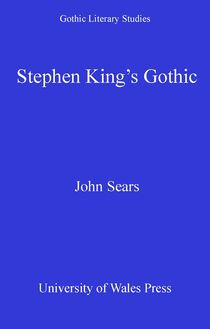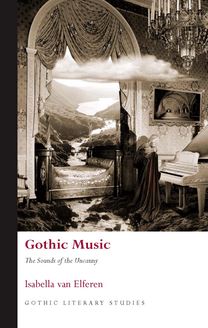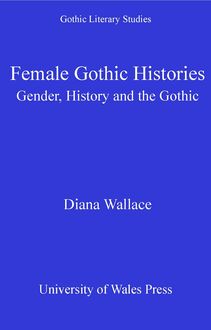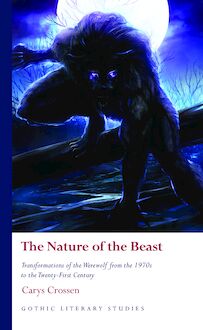-
 Univers
Univers
-
 Ebooks
Ebooks
-
 Livres audio
Livres audio
-
 Presse
Presse
-
 Podcasts
Podcasts
-
 BD
BD
-
 Documents
Documents
-
- Cours
- Révisions
- Ressources pédagogiques
- Sciences de l’éducation
- Manuels scolaires
- Langues
- Travaux de classe
- Annales de BEP
- Etudes supérieures
- Maternelle et primaire
- Fiches de lecture
- Orientation scolaire
- Méthodologie
- Corrigés de devoir
- Annales d’examens et concours
- Annales du bac
- Annales du brevet
- Rapports de stage
La lecture à portée de main
Vous pourrez modifier la taille du texte de cet ouvrage
Découvre YouScribe en t'inscrivant gratuitement
Je m'inscrisWomen's Ghost Literature in Nineteenth-Century Britain , livre ebook
Découvre YouScribe en t'inscrivant gratuitement
Je m'inscrisEn savoir plus
Vous pourrez modifier la taille du texte de cet ouvrage
En savoir plus

Description
Sujets
Informations
| Publié par | University of Wales Press |
| Date de parution | 15 février 2013 |
| Nombre de lectures | 0 |
| EAN13 | 9780708326978 |
| Langue | English |
Informations légales : prix de location à la page 0,1250€. Cette information est donnée uniquement à titre indicatif conformément à la législation en vigueur.
Extrait
WOMEN’S GHOST LITERATURE IN NINETEENTH-CENTURY BRITAIN
SERIES PREFACE
Gothic Literary Studies is dedicated to publishing groundbreaking scholarship on Gothic in literature and film. The Gothic, which has been subjected to a variety of critical and theoretical approaches, is a form which plays an important role in our understanding of literary, intellectual and cultural histories. The series seeks to promote challenging and innovative approaches to Gothic which question any aspect of the Gothic tradition or perceived critical orthodoxy.
Volumes in the series explore how issues such as gender, religion, nation and sexuality have shaped our view of the Gothic tradition. Both academically rigorous and informed by the latest developments in critical theory, the series provides an important focus for scholarly developments in Gothic studies, literary studies, cultural studies and critical theory. The series will be of interest to students of all levels and to scholars and teachers of the Gothic and literary and cultural histories.
SERIES EDITORS
Andrew Smith, University of Sheffield
Benjamin F. Fisher, University of Mississippi
EDITORIAL BOARD
Kent Ljungquist, Worcester Polytechnic Institute Massachusetts
Richard Fusco, St Joseph’s University, Philadelphia
David Punter, University of Bristol
Chris Baldick, University of London
Angela Wright, University of Sheffield
Jerrold E. Hogle, University of Arizona
Women’s Ghost Literature in Nineteenth-Century Britain
Melissa Edmundson Makala
UNIVERSITY OF WALES PRESS
CARDIFF
2013 -->
© Melissa Edmundson Makala, 2013
All rights reserved. No part of this book may be reproduced in any material form (including photocopying or storing it in any medium by electronic means and whether or not transiently or incidentally to some other use of this publication) without the written permission of the copyright owner. Applications for the copyright owner’s written permission to reproduce any part of this publication should be addressed to the University of Wales Press, 10 Columbus Walk, Brigantine Place, Cardiff CF10 4UP.
www.uwp.co.uk
British Library CIP Data A catalogue record for this book is available from the British Library.
ISBN 978-0-7083-2564-3 e-ISBN 978-0-7083-2697-8
The right of Melissa Edmundson Makala to be identified as author of this work has been asserted in accordance with sections 77 and 79 of the Copyright, Designs and Patents Act 1988.
Typeset in Wales by Eira Fenn Gaunt, Cardiff Printed by CPI Antony Rowe, Chippenham, Wiltshire
For my parents, Rudy and Karen
C ONTENTS
Acknowledgements
Introduction
1 Female Revenants and the Beginnings of Women’s Ghost Literature
2 Ghostly Lovers and Transgressive Supernatural Sexualities
3 ‘Uncomfortable Houses’ and the Spectres of Capital
4 Haunted Empire: Spectral Uprisings as Imperialist Critique
Conclusion
Notes
Bibliography
A CKNOWLEDGEMENTS
I would like to thank the staffs of the following institutions for their assistance with this project: the Rare Books, Manuscripts and India Office Records sections of the British Library, the Department of Special Collections at Edinburgh University Library, the National Library of Scotland, the Special Collections Library at Pennsylvania State University and the Department of Rare Books and Special Collections at the University of South Carolina. I would also like to thank the British Library, Edinburgh University Library and Pennsylvania State University Library for permitting quotations from letters in their collections. An abridged version of Chapter 3 appeared as ‘The “Uncomfortable Houses” of Charlotte Riddell and Margaret Oliphant’ in Gothic Studies 12/1 (May 2010), and part of Chapter 4 was published in an earlier version as ‘Bithia Mary Croker and the Ghosts of India’ in The CEA Critic 72/2 (Winter 2010). Thanks to the editors of these journals for granting me permission to reproduce this material.
I would like to express my gratitude to Paula R. Feldman, who read several early versions of this book, and who was always available to lend advice or talk through certain ideas. Her pioneering work in reclaiming forgotten British women writers has greatly influenced my own research and continues to inspire me. This book would not have been possible without the early support of Andrew Smith, who offered invaluable comments and suggestions during the manuscript stages. It was a rewarding experience to work with such a gracious scholar in the field of Gothic studies. My sincere thanks go as well to the reviewer for the University of Wales Press, whose careful readings and insightful suggestions made this a better book. Sarah Lewis likewise has my gratitude for her early interest in the project, her patience, and her overall guidance of this volume from the initial evaluation process to final publication.
My appreciation is also due to the women writers discussed in this book, whose work has provided me with years of reading fascinating poems and stories, along with discovering their equally captivating lives through biographies, letters and memoirs. If ghosts do exist, I hope these women are smiling approvingly as I write.
I would especially like to thank the family and friends who encouraged me throughout my years of research and writing. This book could not have been completed without the love and support of my parents and grandparents, who fostered my interest in literature and history from an early age. Growing up in a house full of books, ideas and conversation most certainly led me to pursue a life of research and writing. I would also like to express my appreciation to my grandmother, Dixie, who earned her college degree during the 1930s and became a much-loved elementary school teacher. She taught me the importance of an education and never let me forget how proud she was of me for continuing on to graduate school. She didn’t live to see this book completed, but her memory was with me every step of the way. I would especially like to thank Jeff, who read and commented on several early drafts and assisted in my endless quest for obscure sources. He has offered advice and support throughout the creation of this book and has otherwise patiently lived with my interest in ghosts and the Gothic over the years. Final thanks go to Dalton and Murray for always being there.
‘At my nativity
The front of heaven was full of fiery shapes
Of burning cressets …
… I can call spirits from the vasty deep.’
– Shakespeare’s Henry IV, Part I ,
as quoted by Elizabeth Gaskell in ‘The Doom of the Griffiths’
Introduction
Prior to the nineteenth century, there were a small number of ghost stories and poems written by women, but these works had limited printings and today are exceedingly rare. Sarah Malthus’s pamphlet, King William’s Ghost (1704) and Elizabeth Boyd’s ballad ‘Altamira’s Ghost; Or Justice Triumphant’ (1744), which tells of a barony dispute between an uncle and his nephew, are two examples of works by women who used their writings as a means of social and political commentary. However, during the nineteenth century, ghost literature became increasingly popular among women writers. It was published in collections of supernatural tales and was regularly seen in magazines throughout the century, including special Christmas issues. These stories and poems also were frequently published in keepsakes, under such titles as ‘The Regretted Ghost’ (1826) by Mrs Hofland and ‘A Ghost Story’ (1846) by the Countess of Blessington. In their Oxford Book of Victorian Ghost Stories (1991), Michael Cox and R. A. Gilbert state that ‘the reasons why women took to the ghost story so successfully is one of the great unasked critical questions’. 1 Their answer to this question is the one usually given by critics: women writers needed to make a living and tended toward the ever-popular and reliable ghost story to make money. This reason is no doubt true for many women writers of the century, ranging from writers of chapbook ballads in the early 1800s to authors of penny-dreadfuls and ‘shilling shockers’ later in the century. But for many women who included supernatural plotlines in their writing, this argument does not present the entire rationale behind the phenomenon. These authors understood that any writing by a woman which sought to critique gender inequality or their country’s involvement in questionable socio-political or imperial practices would be automatically subjected to greater scrutiny by reviewers, as well as the general reading public. Regarding the publication of her Gothic ballad collection, Tales of Superstition and Chivalry (1802), Anne Bannerman admitted to her publisher, Thomas Hood, that she was ‘well aware that from their peculiarity of subject, it was not to be expected they could please generally’. 2 Other authors, such as Ellen Wood and Bithia Mary Croker, who had already achieved financial success as writers of popular romance novels, later ventured into the realm of the ghost story without being assured of a financial profit. At the turn of the century, Olive Schreiner used the supernatural in Trooper Peter Halket of Mashonland (1897) to critique the controversial policies of Cecil Rhodes. The title page to the first edition of the work, showing hanged native Africans, was subsequently banned in later London editions. Schreiner’s choice of subject almost assuredly had more to do with raising British awareness of the problems in South Africa after the notoriously badly handled Jameson raid on the Transvaal Republic in 1895–6 than with making money by serving the public taste with run-of-the-mill romance or sensation novels.
Throughout the nineteenth century, women emphasized the importance of the supernatural and repeatedly discussed an artistic and intellectual appreciation for the possibilities of the genre that goes beyond a mere obsession with financial prof
-
 Univers
Univers
-
 Ebooks
Ebooks
-
 Livres audio
Livres audio
-
 Presse
Presse
-
 Podcasts
Podcasts
-
 BD
BD
-
 Documents
Documents
-
Jeunesse
-
Littérature
-
Ressources professionnelles
-
Santé et bien-être
-
Savoirs
-
Education
-
Loisirs et hobbies
-
Art, musique et cinéma
-
Actualité et débat de société
-
Jeunesse
-
Littérature
-
Ressources professionnelles
-
Santé et bien-être
-
Savoirs
-
Education
-
Loisirs et hobbies
-
Art, musique et cinéma
-
Actualité et débat de société
-
Actualités
-
Lifestyle
-
Presse jeunesse
-
Presse professionnelle
-
Pratique
-
Presse sportive
-
Presse internationale
-
Culture & Médias
-
Action et Aventures
-
Science-fiction et Fantasy
-
Société
-
Jeunesse
-
Littérature
-
Ressources professionnelles
-
Santé et bien-être
-
Savoirs
-
Education
-
Loisirs et hobbies
-
Art, musique et cinéma
-
Actualité et débat de société
- Cours
- Révisions
- Ressources pédagogiques
- Sciences de l’éducation
- Manuels scolaires
- Langues
- Travaux de classe
- Annales de BEP
- Etudes supérieures
- Maternelle et primaire
- Fiches de lecture
- Orientation scolaire
- Méthodologie
- Corrigés de devoir
- Annales d’examens et concours
- Annales du bac
- Annales du brevet
- Rapports de stage




















